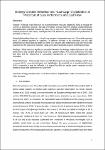Strategy creation behaviour and “last gasp” digitalization as predictors of sales performance and cash flow
| dc.contributor.author | Onjewu, Adah | |
| dc.contributor.author | Nyuur, Richard | |
| dc.contributor.author | Paul, S | |
| dc.contributor.author | Wang, Y | |
| dc.date.accessioned | 2023-12-22T15:54:16Z | |
| dc.date.available | 2023-12-22T15:54:16Z | |
| dc.date.issued | 2023-01-01 | |
| dc.identifier.issn | 1355-2554 | |
| dc.identifier.uri | https://pearl.plymouth.ac.uk/handle/10026.1/21841 | |
| dc.description.abstract |
Purpose Although recent literature has examined diverse measures adopted by SMEs to navigate the COVID-19 turbulence, there is a shortage of evidence on how crisis-time strategy creation behaviour and digitalization activities increase (1) sales and (2) cash flow. Thus, predicated on a novel strategy creation perspective, this inquiry aims to investigate the crisis behaviour, sales and cash flow performance of 528 SMEs in Morocco. Design/methodology/approach Novel links between (1) aggregate wage cuts, (2) variable operating hours, (3) deferred payment to suppliers, (4) deferred payment to tax authorities and (5) sales performance are developed and tested. A further link between sales performance and cash flow is also examined and the analysis is conducted using a non-linear structural equation modelling technique. Findings While there is a significant association between strategy creation behaviours and sales performance, only variable operating hours have a positive effect. Also, sales performance increases cash flow and this relationship is substantially strengthened by e-commerce digitalization and innovation. Originality/value Theoretically, to the best of the authors’ knowledge, this is one of the first inquiries to espouse the strategy creation view to explain SMEs' crisis-time behaviour and digitalization. For practical purposes, to supplement Moroccan SMEs' propensity to seek tax deferrals, it is argued that debt and equity support measures are also needed to boost sales performance and cash flow. | |
| dc.language | en | |
| dc.publisher | Emerald | |
| dc.title | Strategy creation behaviour and “last gasp” digitalization as predictors of sales performance and cash flow | |
| dc.type | Journal Article | |
| plymouth.publication-status | Published online | |
| plymouth.journal | International Journal of Entrepreneurial Behavior & Research | |
| dc.identifier.doi | 10.1108/ijebr-02-2023-0165 | |
| plymouth.organisational-group | |Plymouth | |
| plymouth.organisational-group | |Plymouth|Faculty of Arts, Humanities and Business | |
| plymouth.organisational-group | |Plymouth|Users by role | |
| dc.date.updated | 2023-12-22T15:54:02Z | |
| dc.rights.embargodate | 2023-12-23 | |
| rioxxterms.versionofrecord | 10.1108/ijebr-02-2023-0165 |


